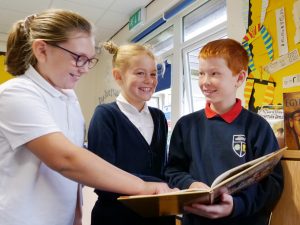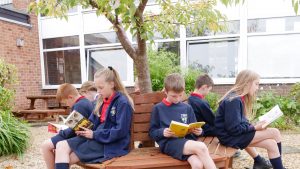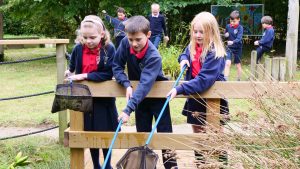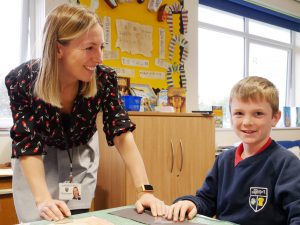A Passion for Learning
 Elvington Church of England Primary School strives for excellence. We adopt a variety of approaches to children’s learning, using class, group and individual teaching as appropriate. Sometimes areas of learning are taught as separate subjects whilst at other times we adopt a more creative curriculum and use topics of interest. Work and play are not seen as opposites, but as complementary for outstanding learning. We use our wonderful grounds which house a covered play area for our younger children, a Science Garden, vegetable patch and a spacious playing field (complete with an all-weather running circuit).
Elvington Church of England Primary School strives for excellence. We adopt a variety of approaches to children’s learning, using class, group and individual teaching as appropriate. Sometimes areas of learning are taught as separate subjects whilst at other times we adopt a more creative curriculum and use topics of interest. Work and play are not seen as opposites, but as complementary for outstanding learning. We use our wonderful grounds which house a covered play area for our younger children, a Science Garden, vegetable patch and a spacious playing field (complete with an all-weather running circuit).
Children are encouraged to “have a growth mindset” and feel comfortable asking for help and discussing any issue, no matter how large or small, with their class teachers and support staff.
The National Curriculum
The current Primary Curriculum, which was implemented in 2014, applies to children in Year 1 through to Year 6 and covers all subjects from Maths and English through to Art and Computing. A guide to Elvington’s approach can be viewed here.
We have looked carefully at the new curriculum and set out ‘two year rolling programmes’ which show when we will teach each part of the curriculum over the course of two years. This ensures children in mixed age classes are taught everything set out in the curriculum whichever class they may be in. We have linked the subjects as much as possible in each term to allow the children to learn through a ‘topic based’ approach to learning; in this way more than one subject may be taught within a lesson and a range of skills learned.
In September 2021 a new Curriculum was introduced for the Early Years Foundation stage. This will be implemented, with the areas of learning being linked by staff to the National Curriculum wherever possible.
The topic titles on the rolling programmes are a starting point for each topic and may change or be adapted, often based on the children’s interests, to make the learning as inspiring and engaging as possible.
Please visit the Progression of Skills and Knowledge page to read how teachers at Elvington ensure that children’s skills are developed appropriately over time and across the whole curriculum.

Why and how has the decision to mix year groups been made?
Every year we review the numbers in each year group, as well as the individual needs of pupils in the group, the staffing and the classes we have. We then model different scenarios for the year, and subsequent years, and discuss this with Governors. We consider the needs of the year groups alongside the budgetary implications of the different scenarios.
We have to consider the best ways to meet the needs of all of the year groups. There is never one simple answer but a key factor is that we do not prioritise the needs of one year group above the needs of another.

Why do mixed classes happen in different year groups at different times?
This is wholly because of fluctuating numbers over time. As each year group has a different amount of children in it, bespoke arrangements must be made to accommodate.
Staff are aware of the potential complexities of teaching mixed classes as well as the challenges that could arise if teaching is not effective. However, we work hard to ensure the following benefits are created:
- Planning and preparation can be shared and approached together across classes with children in the same year group.
- Children have a great opportunity to build independence in their learning. In this way, children do not always reply on adult support to access a task and become more confident independent learners.
- A sizable positive is that pupil numbers will be unlikely to exceed 25 children in any of our five classes. This higher than average staff member to pupil ratio will support every child’s holistic development through bespoke support.
- Children benefit in many ways from the opportunity to become an ‘expert’ for the younger children, and a positive role model which the younger children often aspire to. However, this is not used as a strategy if it will mean the older child miss out on their own learning opportunities or that the younger children feel inferior to their older classmates.
- Mixed grouping can enhance and nurture deeper thinking and problem solving skills across all subject areas.
- In English mixed grouping allows for a wider range of vocabulary to be taught and children to learn stronger social and verbal competences. Children can become strong communicators using language often beyond their current year group.
- There can be a greater sense of co-operation and opportunities to work with a wider circle of peers and opportunities to build friendships from across different year group.

How will pupil progress be monitored?
- Teachers regularly assess pupils, both informally (from day to day) and formally (with tests and other assessments). Where pupils need extra help we work on creative ways to support this through the use of Progress Support Plans. This could be in class or through intervention groups.
- Teachers regularly compare books across the team to compare outcomes and develop consistency between different teachers.
- Members of the Leadership Team frequently monitor lessons and books; this includes observations of lessons. Where things could be improved, staff are supported in this.
- Three times a year we hold Pupil Progress Meetings which focus on monitoring assessment information and ensuring that pupils are making the progress we expect based on their previous attainment. Information from these meetings is shared with Governors as part of their monitoring role.
- Staff Appraisals are linked to pupils’ outcomes, progress over time and progress towards targets.
- Governors monitor the progress of pupils termly, as well as over time.

Research based benefits to mixed age classes
A study by Simon Veenman titled ‘Cognitive and Noncognitive Effects of Multigrade and Multi-Age Classes: A Best-Evidence Synthesis’ found that there is no empirical evidence that student learning suffered in any way in multi age (mixed age) classrooms. Children in such classrooms did not learn more or less than students in single age classes. In fact, students in multi age classes scored higher on attitudes towards school, personal adjustment and self-concept than students in single age classes.
Elvington’s academic attainment and progress overtime is testament to the success of mixed age classes. We are very proud that a high proportion of our children attain significantly above national and local comparisons, not only to attain the expected standard, but go beyond this to achieve greater depth. This represents many years of hard work and dedication from the beginning of Early Years to Year 6.
If you have any questions about class structure, please don’t hesitate to contact Mr. Buttery: head@elvingtonprimary.org.uk.

